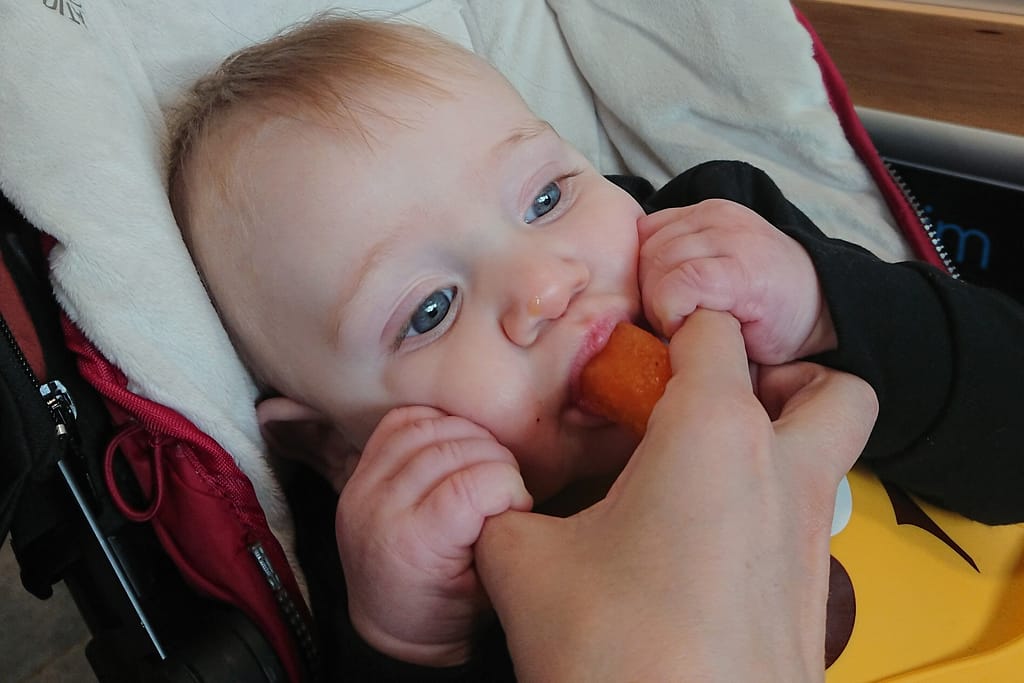Introducing your child to food
So, your baby is nearly 6 months old, and you are researching how best to approach weaning onto solids. It is recommended that you don’t start solids before 6 months old. Though your baby may show signs of being ready earlier than 6 months, it is not recommended. This is to ensure that your child’s stomach is ready. Here is some information on the NHS website. I am not a professional, simply writing from experience.
It is not a race to get baby-eating food.
You should be thinking about their future well-being. There are many signs that your baby is ready to eat food. These include being able to sit up in a highchair unassisted, being able to grasp food and put it to their mouths, and showing an interest in foods, as well as having grown out of their tongue thrust reflex.
Knowing what foods to start with can be daunting. There is so much information out there. First, you must decide how you want to start your weaning journey. Do you want to spoon-feed or baby-led wean? We started spoon-feeding with our first but soon realised that he was not impressed with that idea. So, with our second we just dove straight into baby-led weaning and never looked back.
Baby-Led Weaning
Baby-led weaning is a great way to introduce solids and allow your baby to experience food at their own pace. There is little to no spoon feeding, and you offer your baby soft pieces of food that they can hold in their hands, but not so small that they could choke. You can also put pieces of the food you are having on a plate or tray for your baby to try. Baby-led weaning can help your child regulate their own food intake and may also improve eating patterns. This is because your baby can respond to their own hunger cues, meaning they can eat what they need and self-regulate leading to a healthier weight gain.

It is however important that your baby gets all the nutrients that they need, most of which will still come from milk until they are at least 1 year old, but they can still get a lot from food.
Spoon Feeding
Spoon feeding is where you start your baby off with purees and slowly introduce textures by feeding your baby. You must remember not to force your baby to eat anything they are not interested in. You want your baby to have a healthy relationship with food, so it is best to follow your baby’s lead even with spoon-feeding.
My children both love flavoursome food and flavoursome foods will not hurt your child. There are foods that are best avoided when your first start weaning, and some are mentioned later on.
Some little ideas
When serving your child food, put everything on the same plate. Yes, even “dessert”. This might sound controversial, but by doing this you are telling your child that food is food. Yes, balance is important. By allowing them access to “dessert” food without any stipulations, you are getting rid of its power. To your child, it will just be food, and you will be surprised how over time they don’t crave it like we do.
Introduce them to different flavours. Not just your bland carrots. Make some dishes from around the world for your child to enjoy. (Remember to keep the spice low) Spice does not equal flavour.
Create a meal plan for the whole family. All eat the same meal at dinner time and sat around the table. Remember food should be a social event.
Foods to avoid
Choking hazard
Foods that are small, round, or hard are a major choking hazard for a young baby. Things such as popcorn, nuts, or grapes. When you do introduce grapes, you need to chop them vertically into halves or quarters to be safe.

Sugary foods
These types of foods are bad for a child’s health and can lead to tooth decay, weight gain and health problems. Though they are not terrible in small quantities, they need to be part of a well-balanced diet.
Salt & Sugar
These should not be added to your baby’s food, they are not essential nutrients and can cause health problems. In all fairness, you shouldn’t be adding them to your food either.
Honey
Honey must be avoided until your child is over one year old. It is a live food and has the possibility of causing botulism. Click here to see more information about it.
Foods to Encourage
Fruits & Vegetables
These are excellent sources of fibre, vitamins, and minerals. Keep things interesting by alternating the types of fruits and vegetables that you give to your baby. Make dinnertime colourful and fun.
Whole Grains
Whole grains such as oatmeal and rice are excellent sources of fibre and other essential nutrients. Have these as a side to your child’s meals, or make cookies out of them.
Lean Protein
Lean proteins are essential for your baby’s growth and development. Fish, chicken and beans contain lean proteins.
Healthy Fats
Avocados, nuts and seeds contain healthy fats. Blend nuts into a sauce, to introduce them to your child.
Conclusion
Make weaning fun. Try to eat as a family where you all have the same meal. One of the most important things is facilitating a healthy relationship with food. Try not to put foods on a pedestal, such as a dessert. Don’t push your child to finish their plate, let them listen to their hunger cues. Don’t make them feel guilty for not eating food that you or someone else has bought or made. It is not their responsibility to please you with what they eat.

Leave a Reply